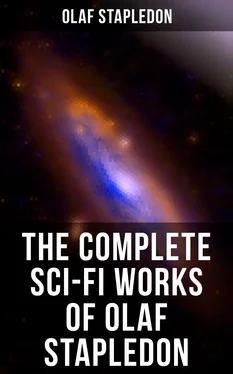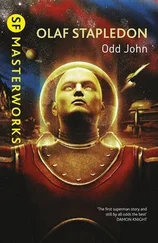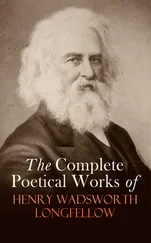Olaf Stapledon - The Complete Sci-Fi Works of Olaf Stapledon
Здесь есть возможность читать онлайн «Olaf Stapledon - The Complete Sci-Fi Works of Olaf Stapledon» — ознакомительный отрывок электронной книги совершенно бесплатно, а после прочтения отрывка купить полную версию. В некоторых случаях можно слушать аудио, скачать через торрент в формате fb2 и присутствует краткое содержание. Жанр: unrecognised, на английском языке. Описание произведения, (предисловие) а так же отзывы посетителей доступны на портале библиотеки ЛибКат.
- Название:The Complete Sci-Fi Works of Olaf Stapledon
- Автор:
- Жанр:
- Год:неизвестен
- ISBN:нет данных
- Рейтинг книги:5 / 5. Голосов: 1
-
Избранное:Добавить в избранное
- Отзывы:
-
Ваша оценка:
- 100
- 1
- 2
- 3
- 4
- 5
The Complete Sci-Fi Works of Olaf Stapledon: краткое содержание, описание и аннотация
Предлагаем к чтению аннотацию, описание, краткое содержание или предисловие (зависит от того, что написал сам автор книги «The Complete Sci-Fi Works of Olaf Stapledon»). Если вы не нашли необходимую информацию о книге — напишите в комментариях, мы постараемся отыскать её.
Novels:
Last and First Men: A Story of the Near and Far Future
Last Men in London
Odd John: A Story Between Jest and Earnest
Star Maker
Darkness and the Light
Sirius: A Fantasy of Love and Discord
Death into Life
Short Stories:
The Flames (1947)
The Seed and the Flower
The Road to the Aide Post
A Modern Magician
East is West
A World of Sounds
Arms Out of Hand
The Complete Sci-Fi Works of Olaf Stapledon — читать онлайн ознакомительный отрывок
Ниже представлен текст книги, разбитый по страницам. Система сохранения места последней прочитанной страницы, позволяет с удобством читать онлайн бесплатно книгу «The Complete Sci-Fi Works of Olaf Stapledon», без необходимости каждый раз заново искать на чём Вы остановились. Поставьте закладку, и сможете в любой момент перейти на страницу, на которой закончили чтение.
Интервал:
Закладка:
The other great heresy was derived partly from the energy of repressed intellective impulses, and was practised by persons of natural curiosity, who nevertheless, shared the universal paucity of intelligence. These pathetic devotees of intellect were inspired by Socrates. That great primitive had insisted that clear thought is impossible without clear definition of terms, and that without clear thinking man misses fullness of being. These his last disciples were scarcely less fervent admirers of truth than their master, yet they missed his spirit completely. Only by knowing the truth, they said, can the individual attain immortality; only by defining can he know the truth. Therefore, meeting together in secret, and in constant danger of arrest for illicit intellection, they disputed endlessly about the definition of things. But the things which they were concerned to define were not the basic concepts of human thought; for these, they affirmed, had been settled once for all by Socrates and his immediate followers. Therefore, accepting these as true, and grossly misunderstanding them, the ultimate Socratics undertook to define all the processes of the world state and the ritual of the established religion, all the emotions of men and women, all the shapes of noses, mouths, buildings, mountains, clouds, and in fact the whole superficies of their world. Thus they believed that they emancipated themselves from the philistinism of their age, and secured comradeship with Socrates in the hereafter.
5. DOWNFALL
Table of Contents
The collapse of this first world-civilization was due to the sudden failure of the supplies of coal. All the original fields had been sapped centuries earlier, and it should have been obvious that those more recently discovered could not last for ever. For some thousands of years the main supply had come from Antarctica. So prolific was this continent that latterly a superstition had arisen in the clouded minds of the world-citizens that it was in some mysterious manner inexhaustible. Thus when at last, in spite of strict censorship, the news began to leak out that even the deepest possible borings had failed to reveal further vegetable deposits of any kind, the world was at first incredulous.
The sane policy would have been to abolish the huge expense of power on ritual flying, which used more of the community’s resources than the whole of productive industry. But to believers in Gordelpus such a course was almost unthinkable. Moreover it would have undermined the flying aristocracy. This powerful class now declared that the time had come for the release of the secret of divine power, and called on the S.O.S. to inaugurate the new era. Vociferous agitation in all lands put the scientists in an awkward plight. They gained time by declaring that, though the moment of revelation was approaching, it had not yet arrived; for they had received a divine intimation that this failure of coal was imposed as a supreme test of man’s faith. The service of Gordelpus in ritual flight must be rather increased than reduced. Spending a bare minimum of its power on secular matters, the race must concentrate upon religion. When Gordelpus had evidence of their devotion and trust, he would permit the scientists to save them.
Such was the prestige of science that at first this explanation was universally accepted. The ritual flights were maintained. All luxury trades were abolished, and even vital services were reduced to a minimum. Workers thus thrown out of employment were turned over to agricultural labour; for it was felt that the use of mechanical power in mere tillage must be as soon as possible abolished. These changes demanded far more organizing ability than was left in the race. Confusion was widespread, save here and there where serious organization was attempted by certain Jews.
The first result of this great movement of economy and self-denial was to cause something of a spiritual awakening among many who had formerly lived a life of bored ease. This was augmented by the widespread sense of crisis and impending marvels. Religion, which, in spite of its universal authority in this age, had become a matter of ritual rather than of inward experience, began to stir in many hearts—not indeed as a moment of true worship, but rather as a vague awe, not unmixed with self-importance.
But as the novelty of this enthusiasm dwindled, and life became increasingly uncomfortable, even the most zealous began to notice with horror that in moments of inactivity they were prone to doubts too shocking to confess. And as the situation worsened, even a life of ceaseless action could not suppress these wicked fantasies.
For the race was now entering upon an unprecedented psychological crisis, brought about by the impact of the economic disaster upon a permanently unwholesome mentality. Each individual, it must be remembered, had once been a questioning child, but had been taught to shun curiosity as the breath of Satan. Consequently the whole race was suffering from a kind of inverted repression, a repression of the intellective impulses. The sudden economic change, which affected all classes throughout the planet, thrust into the focus of attention a shocking curiosity, an obsessive scepticism, which had hitherto been buried in the deepest recesses of the mind.
It is not easy to conceive the strange mental disorder that now afflicted the whole race, symbolizing itself in some cases by fits of actual physical vertigo. After centuries of prosperity, of routine, of orthodoxy, men were suddenly possessed by a doubt which they regarded as diabolical. No one said a word of it; but in each man’s own mind the fiend raised a whispering head, and each was haunted by the troubled eyes of his fellows. Indeed the whole changed circumstances of his life jibed at his credulity.
Earlier in the career of the race, this world crisis might have served to wake men into sanity. Under the first pressure of distress they might have abandoned the extravagances of their culture. But by now the ancient way of life was too deeply rooted. Consequently, we observe the fantastic spectacle of a world engaged, devotedly and even heroically, on squandering its resources in vast aeronautical displays, not through single-minded faith in their rightness and efficacy, but solely in a kind of desperate automatism. Like those little rodents whose migration became barred by an encroachment of the sea, so that annually they drowned themselves in thousands, the First Men helplessly continued in their ritualistic behaviour; but unlike the lemmings, they were human enough to be at the same time oppressed by unbelief, an unbelief which, moreover, they dared not recognize.
Meanwhile the scientists were earnestly and secretly delving in the ancient literature of their science, in hope of discovering the forgotten talisman. They undertook also clandestine experiments, but upon a false trail laid by the wily English contemporary of the Discoverer. The main results were, that several researchers were poisoned or electrocuted, and a great college was blown up. This event impressed the populace, who supposed the accident to be due to an over-daring exercise of the divine potency. The misunderstanding inspired the desperate scientists to rig further impressive ‘miracles’, and moreover to use them to dispel the increasing restlessness of hungry industrial workers. Thus when a deputation arrived outside the offices of Cosmopolitan Agriculture to demand more flour for industrialists Gordelpus miraculously blew up the ground on which they stood, and flung their bodies among the onlookers. When the agriculturists of China struck to obtain a reasonable allowance of electric power for their tillage, Gordelpus affected them with an evil atmosphere, so that they choked and died in thousands. Stimulated in this manner by direct divine intervention, the doubting and disloyal elements of the world-population recovered their faith and their docility. And so the world jogged on for a while, as nearly as possible as it had done for the last four thousand years, save for a general increase of hunger and ill-health.
Читать дальшеИнтервал:
Закладка:
Похожие книги на «The Complete Sci-Fi Works of Olaf Stapledon»
Представляем Вашему вниманию похожие книги на «The Complete Sci-Fi Works of Olaf Stapledon» списком для выбора. Мы отобрали схожую по названию и смыслу литературу в надежде предоставить читателям больше вариантов отыскать новые, интересные, ещё непрочитанные произведения.
Обсуждение, отзывы о книге «The Complete Sci-Fi Works of Olaf Stapledon» и просто собственные мнения читателей. Оставьте ваши комментарии, напишите, что Вы думаете о произведении, его смысле или главных героях. Укажите что конкретно понравилось, а что нет, и почему Вы так считаете.












